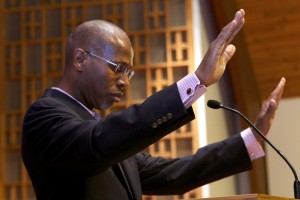 The Black Church has been a strong pillar of the community. I pray that it will have the courage not only to accept, but affirm its gay, lesbian, bisexual and transgender children.
The Black Church has been a strong pillar of the community. I pray that it will have the courage not only to accept, but affirm its gay, lesbian, bisexual and transgender children.
The recent VH1 segment, Out in Hip Hop: What Happens When Your Church Doesn’t Accept You; and the recently released BET documentary, Holler If You Hear Me: Black and Gay in the Church reminded me of what I hear over and over again from Black LGBTQ people who experience a loss of connection to the essential social/spiritual network of support that faith communities provide.
The prevailing Black Church culture forces too many to face the untenable choice: hide behind a mask or be cast aside from an extended family they’ve known all their lives.
Regrettably, too many religious leaders have been so influenced by condemnatory reading of the scriptures that the very idea of embrace and affirmation of same-gender-loving people seems impossible. But the essential message Jesus proclaims in the sacred text is love of God, love of self and love of neighbor. Our Christian duty is to practice the unconditional loving-kindness God exhibited. God’s presence among the oppressed, outcast, marginalized, and captive trumps harmful and hurtful teachings that drive people away instead of drawing them closer.
As a minister, I am appalled when people make the poisonous claim that the LGBTQ “lifestyle” is a “sin.” In my view, the real “sin” is the overemphasis on condemning gay and lesbian persons, while passively ignoring the harming and hurting it causes. Consider that Black LGBTQ youth disproportionately experience homelessness. And that they are more likely to be impacted by the same employment, education, health care, and justice system inequities that all Black Americans face.
Family acceptance is a leading predictor of well-being for LGBTQ youth, yet the influence of the church often tips the scale for their families toward condemnation. That’s why ending the vitriol that has flowed across pulpits is so critically important and necessary. We can and must do more.
We must continue theological, sexuality and gender education in the church to mitigate other related problems as well, like the intimate partner violence plaguing our churches and communities. We have chosen an atmosphere of deafening silence about human sexuality. But the pathologies at the root of the rising numbers of transgender deaths within our communities are inseparable from the pathologies at the root of domestic violence in heterosexual relationships. All relationships are subject to abuse, exploitation, and violence–LGBTQ or not.
Some pastors and clergy leaders may not know how to start their churches on the journey toward greater acceptance. The organization I lead, Many Voices, is just one place to go for support. We provide the teaching resources and the space congregations need to confront conflicting feelings.
My mother used to tell me, “Wisdom is the principal thing; therefore get wisdom; and with all thy getting, get understanding.” When we truly understand the truth of the lives of our Black LGBTQ family members, friends, neighbors, and church members the ease of naming them “sinner” will subside and our ability to love unconditionally will grow.
A strong sense of loyalty, faithfulness, and love of “church family” has held many LGBTQ people in place–even as invisibility and denial overshadows the possibility of personal authenticity in the church. It is impossible to deny the presence of same-gender-loving people in the Black Church historically as leaders, builders, and inspiring spirit-filled contributors to the life and growth of the church. The Black Church has been a strong pillar of the community. I pray that it will have the courage not only to accept, but affirm its gay, lesbian, bisexual and transgender children.
This post was first published by The Huffington Post.
Rev. Cedric A. Harmon is the Executive Director of Many Voices: A Black Church Movement for LGBT Justice as well as a speaker, writer, and someone who is standing for human rights based in profound faith. Follow Rev. Harmon on Twitter at www.twitter.com/RevCedricMV.